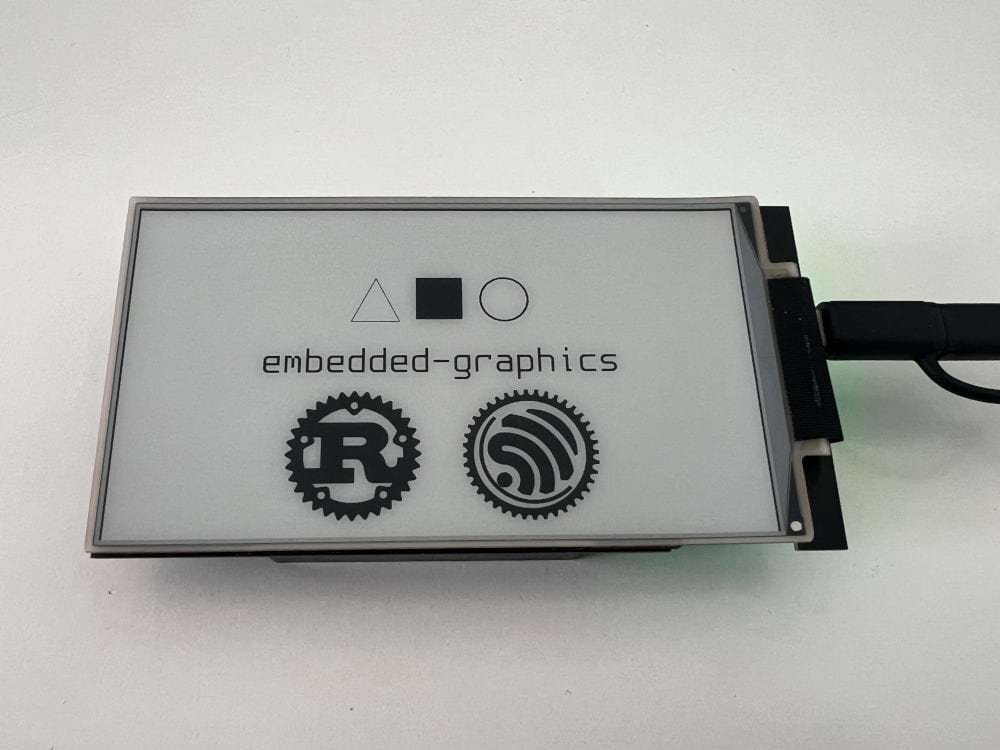6 releases (breaking)
| 0.5.0 | Jan 24, 2025 |
|---|---|
| 0.4.0 | Jan 23, 2025 |
| 0.3.0 | Sep 26, 2024 |
| 0.2.0 | Jul 11, 2024 |
| 0.1.1 | Jul 6, 2024 |
#303 in Embedded development
414 downloads per month
465KB
14K
SLoC
LilyGo EPD47 Rust HAL

Simple driver for the LilyGo T5 4.7 Inch E-Paper display. The driver only supports the V2.3 hardware variant (ESP32-S3).
It should also work on the touch version, but I don't have the necessary hardware to validate that claim.
This library depends on alloc and requires you to set up the global allocator for the PSRAM. This is mainly due to
space requirements of the framebuffer and the lut (~325kb).
Built using esp-hal and embedded-graphics
WARNING:
This is an experimental port of the C library. I ported the basic functionality and tried to simplify it as much as possible. I give no guarantee that this is the correct usage of the hardware, use at your own risk!
Usage
- Prepare your development requirement according to this guide.
- Create a new project, I recommend using
cargo-generateand the template provided byesp-rs(i.e.cargo generate esp-rs/esp-template) - Use the following template for your application and adopt for your needs.
#![no_std]
#![no_main]
extern crate alloc;
use embedded_graphics::{
prelude::*,
primitives::{Circle, PrimitiveStyle},
};
use embedded_graphics_core::pixelcolor::{Gray4, GrayColor};
use esp_backtrace as _;
use esp_hal::{
delay::Delay,
gpio::Io,
prelude::*,
};
use lilygo_epd47::{pin_config, Display, DrawMode};
#[entry]
fn main() -> ! {
let peripherals = esp_hal::init(esp_hal::Config::default());
let io = Io::new(peripherals.GPIO, peripherals.IO_MUX);
let delay = Delay::new();
// Create PSRAM allocator
esp_alloc::psram_allocator!(peripherals.PSRAM, esp_hal::psram);
// Initialise the display
let mut display = Display::new(
pin_config!(io),
peripherals.DMA,
peripherals.LCD_CAM,
peripherals.RMT,
)
.expect("Failed to initialize display");
// Turn the display on
display.power_on();
delay.delay_millis(10);
// clear the screen
display.clear().unwrap();
// Draw a circle with a 3px wide stroke in the center of the screen
// TODO: Adapt to your requirements (i.e. draw whatever you want)
Circle::new(display.bounding_box().center() - Point::new(100, 100), 200)
.into_styled(PrimitiveStyle::with_stroke(Gray4::BLACK, 3))
.draw(&mut display)
.unwrap();
// Flush the framebuffer to the screen
display.flush(DrawMode::BlackOnWhite).unwrap();
// Turn the display of again
display.power_off();
// do nothing
loop {}
}
Examples
Run examples like this cargo run --release --example <name>.
counter- Simple counter that updates every second. Only refreshes the screen partiallygrayscale- Alternating loop between a horizontal/vertical "gradient" of all the available colors. You may notice that the darker colors are harder to distinguish. This is probably due to the waveforms not being used (yet).hello-world-embedded-graphicsdemo. The bmp images used have been converted using imagemagickconvert <source>.png -size 200x200 -background white -flatten -alpha off -type Grayscale -depth 4 <output>.bmpscreen-repair- Showcases how to use the repair methodology provided by lilygo.simple- Boilerplate, same as the example above.deepsleep- Deep sleep example. Note: my board suffered from occasional brownouts, I fixed it using this modification. I measured ~230μA on average during deep sleep using the Nordic PPKII.
Todos
- Basic examples and docs
- Compare performance to original implementation
- Implement Waveforms / LUT
Credits
This project is largely based on the C implementations provided by:
License
Unless otherwise stated the provided code is licensed under the terms of the GNU General Public License v3.0.
Dependencies
~23MB
~424K SLoC